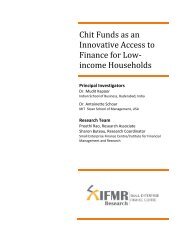Government of India Volume I: Analysis and Recommendations
Government of India Volume I: Analysis and Recommendations
Government of India Volume I: Analysis and Recommendations
Create successful ePaper yourself
Turn your PDF publications into a flip-book with our unique Google optimized e-Paper software.
ANNEXES<br />
(c) There must be ring-fencing <strong>of</strong> banks vis-a-vis other non-bank entities. Further,<br />
banks must not lend to intermediaries which are not regulated by a financial<br />
sector regulator. However, the operation <strong>of</strong> certain financial institutions such<br />
as mutual funds might require access to short-term funding. Such short-term<br />
funding must be within stringent prudential regulations.<br />
7. This WG recommends that laws relating to banking should be ownership neutral<br />
<strong>and</strong> should provide a level playing field for all banks. As a necessary consequence<br />
this WG recommends corporatisation <strong>of</strong> all Public Sector Banks (PSBs). 1<br />
8. In case <strong>of</strong> foreign banks having branches in <strong>India</strong>, this WG recommends that all such<br />
foreign banks set up a Wholly Owned Subsidiary (WOS) in <strong>India</strong>. Transition issues<br />
will need to be addressed by the <strong>Government</strong> <strong>of</strong> <strong>India</strong> (GOI) so that they do not<br />
incur taxation from capital gains, or stamp duty, when they convert from branch<br />
operations to WOS.<br />
9. On the issue <strong>of</strong> deposit taking by co-operative societies this WG recommends that<br />
there should be some restriction on deposit taking by co-operative societies <strong>and</strong><br />
that such activity should fall under the regulatory purview <strong>of</strong> the relevant legislation.<br />
The deliberation was on whether the restriction should be based on number<br />
<strong>of</strong> members or on the value <strong>of</strong> deposits. While some members expressed the view<br />
that restriction should be based on number <strong>of</strong> members i.e. a co-operative society<br />
accepting deposits from more than 50 members should fall within the regulatory<br />
ambit <strong>of</strong> the RBI, the opinion finally weighed in favour <strong>of</strong> value <strong>of</strong> deposits. The WG<br />
finally concluded by recommending that any co-operative credit society accepting<br />
deposits exceeding a specified value must follow the provisions <strong>of</strong> the relevant legislation.<br />
10. The WG recommends that there should be no exemption from the jurisdiction <strong>of</strong><br />
the CCI under the Competition Act, 2002 (Competition Act) for mergers <strong>of</strong> banks.<br />
The WG, however makes a distinction between voluntary <strong>and</strong> assisted mergers. All<br />
voluntary mergers will be subject to the review <strong>and</strong> approval by the competition<br />
regulator. One <strong>of</strong> the key recommendations <strong>of</strong> the Commission is the establishment<br />
<strong>of</strong> a resolution corporation to ensure prompt <strong>and</strong> orderly resolution <strong>of</strong> weak<br />
financial institutions. One <strong>of</strong> the tools <strong>of</strong> resolution involves sale or merger <strong>of</strong> weak<br />
firm with a healthy acquirer through appropriate mechanisms <strong>of</strong> due-diligence. To<br />
achieve this framework, the WG recommends that all assisted mergers involving<br />
sale <strong>of</strong> a failing bank to a healthy bank will be done under the supervisory review<br />
<strong>of</strong> the resolution corporation.<br />
11. This WG recommends corporatisation <strong>of</strong> all PSBs, such as SBI, its subsidiaries, corresponding<br />
new banks within the meaning <strong>of</strong> the Bank Nationalisation Acts <strong>and</strong> RRBs<br />
by converting them into companies under the Companies Act. This would level<br />
the playing field <strong>and</strong> will also rationalise the merger/ amalgamation provisions by<br />
bringing them with a single unified framework under the BR Act. In addition, this<br />
WG also endorses the policy approach that co-operative banks accepting “public<br />
deposits” must obtain a bank license from the regulator.<br />
12. Ownership in banks must be dispersed. The WG recommends that the current position<br />
<strong>of</strong> law in this regard be maintained.<br />
13. Bank supervisors must have powers to comprehensively look at human resource<br />
policy documents <strong>of</strong> a bank <strong>and</strong> recommend changes to the extent such policies<br />
impinge upon excessive risk-taking <strong>and</strong> soundness. The Board <strong>of</strong> Directors (BOD)<br />
<strong>and</strong> shareholders <strong>of</strong> banks must have the power to claw back payments made to<br />
the top management in line with the global trend <strong>of</strong> curbing excessive risk taking<br />
by the top management.<br />
1 In its submission to the Commission, the RBI has made a strong case for integrating the various statutes governing<br />
different segments <strong>of</strong> the banking industry <strong>and</strong> different dimensions <strong>of</strong> the banking business into a harmonised law<br />
to provide clarity <strong>and</strong> transparency.<br />
184 FINANCIAL SECTOR LEGISLATIVE REFORMS COMMISSION



